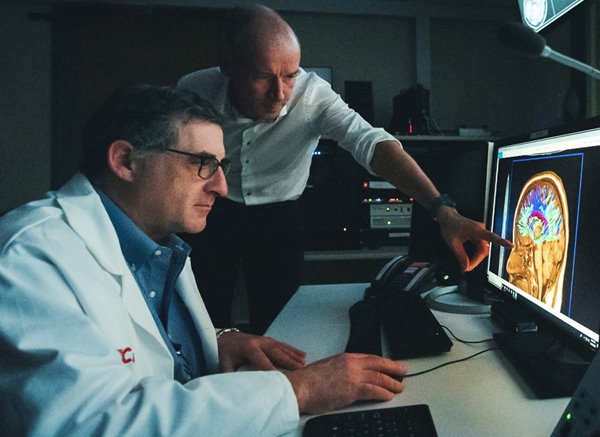What if Alzheimer’s and Parkinson’s could be detected earlier? What if we could more accurately localize the extent of a stroke? What if we understood how the brain responds during a heart attack?
The answers to these questions and more are coming thanks to physicians, technicians, radiologists, clinicians and scientific personnel united around the arrival of a state-of-the-art MRI scanner.
Thousands of patients will benefit from a special delivery Thursday. All the way from Germany, researchers and clinicians alike have been tracking its progress overseas, into the United States and now onto a semi making its way along I-74 to Carle.
The 37,000-pound magnet for the Siemens Healthineers MAGNETOM Terra 7 Tesla (7T) MRI scanner arrives after years of planning. Preparing for its arrival influences the future of healthcare in our community.
 “It’s been a long journey, but we are excited to welcome the 7T and its team of experts to the region,” Jennifer Eardley, PhD, vice president of Research said.
“It’s been a long journey, but we are excited to welcome the 7T and its team of experts to the region,” Jennifer Eardley, PhD, vice president of Research said.
Unique for a number of reasons, this collaboration brings together the Beckman Institute for Advanced Science and Technology at the University of Illinois, with its rich history of MRI technology, and Stephens Family Clinical Research Institute, Carle’s research enterprise, which dedicates itself to supporting new discoveries to jointly address today’s critical healthcare challenges.
“The University of Illinois is internationally recognized for its innovation and impact in biomedical imaging technology,” professor Susan Martinis, who serves as the vice chancellor for research and innovation at the University of Illinois Urbana-Champaign, said. “This investment with Carle, as one of our critical partners, will accelerate our broad efforts to advance healthcare and diagnostic technologies, to benefit patients in our local and global communities. The addition of the 7T MRI scanner will also contribute to our cutting-edge physician training at the Carle-Illinois College of Medicine—the first engineering infused medical school in the world.”
Planning teams have carefully laid out the details to ensure the unit can maintain its critical cooling mechanisms - a superconducting magnet, requiring it to be filled with more than 1000 gallons of liquid helium. Portions of Church Street in Urbana will temporarily close to accommodate the precious cargo from 7 – 11 a.m.
Following an extensive excavation, the basement of Carle Tower will transform into the home of the Carle Illinois Advanced Imaging Center, a research collaboration between Carle and the University of Illinois. The 7T will be the first MR scanner installed, but subsequent phases will follow with more MRIs added or relocated from throughout the system.
 “The active collaboration with Siemens Healthineers is an important factor in the advancement and improvement of patient care,” Carle’s Andrew Webb, PhD, director of Clinical Imaging Research, said. “Results from the device will help doctors and patients make more informed decisions on treatment choices and determine the effectiveness of the treatment.”
“The active collaboration with Siemens Healthineers is an important factor in the advancement and improvement of patient care,” Carle’s Andrew Webb, PhD, director of Clinical Imaging Research, said. “Results from the device will help doctors and patients make more informed decisions on treatment choices and determine the effectiveness of the treatment.”
A Siemens scientist will be on-site to provide a high level of technical expertise and real-time support for the project.
Eardley said the strong partnership between Carle and Illinois made the purchase of the 7T possible and will bring the promise of advancements in disease detection and treatment that will impact patients’ futures.
“With continued local community members who actively engage with and participates in clinical research studies, we’ll benefit generations to come.”
Paul Arnold, MD, associate medical director of the Carle Neuroscience Institute, is excited for the many benefits that will develop out of this meaningful alliance. He believes that the union will allow each to become greater than the sum of our parts and will bring significant strides in both clinical care and research.
“We will have the ability to see features of the brain and spinal cord that were previously imperceptible. This will allow us to better treat our patients going forward,” said Arnold. “The 7T MR scanner can help clinicians uncover abnormalities undetected by conventional, lower-strength MRI systems. And its use extends to patients suffering from traumatic brain injury, too.”
Offering high-quality care and access to research is part of Carle’s core mission.
“Using this innovative technology, we are elevating the care we provide,” Eardley said. “At the same time, we’re working alongside University researchers, the frontiers of modern neuroscience, to discover new properties of the human brain,” she said.
Together, Carle and the University of Illinois can begin to answer the many questions, offering hope.
Tracey Wszalek, PhD, director of the Biomedical Imaging Center at the Beckman Institute for Advanced Science and Technology at the University of Illinois, sums up the impact the partnership expects from this advanced 7T MRI scanner: “Our job is to develop and translate technology for the ultimate improvement of human health.
Categories: Redefining Healthcare
Tags: cancer, community, epilepsy, MRI, neurosciences, partnerships, research, University of Illinois
